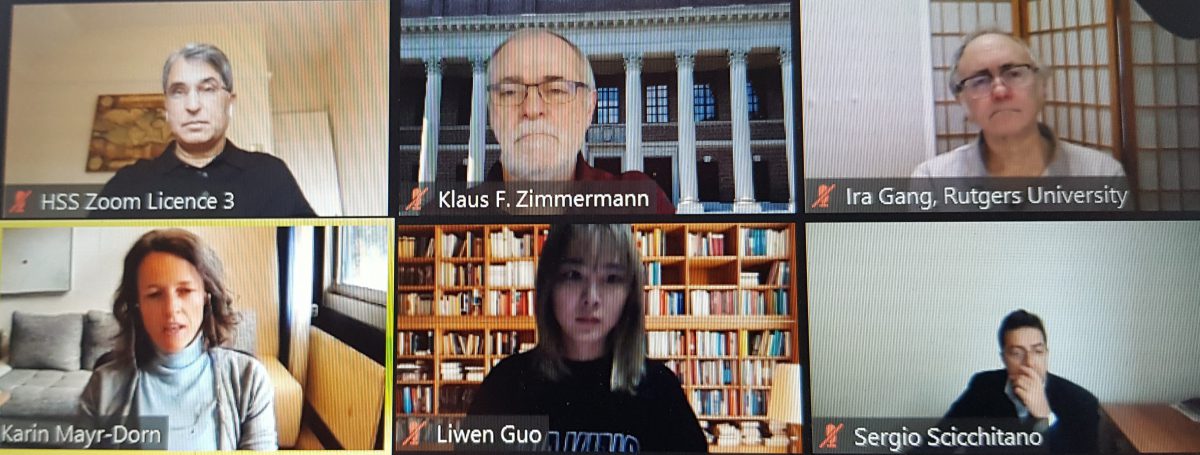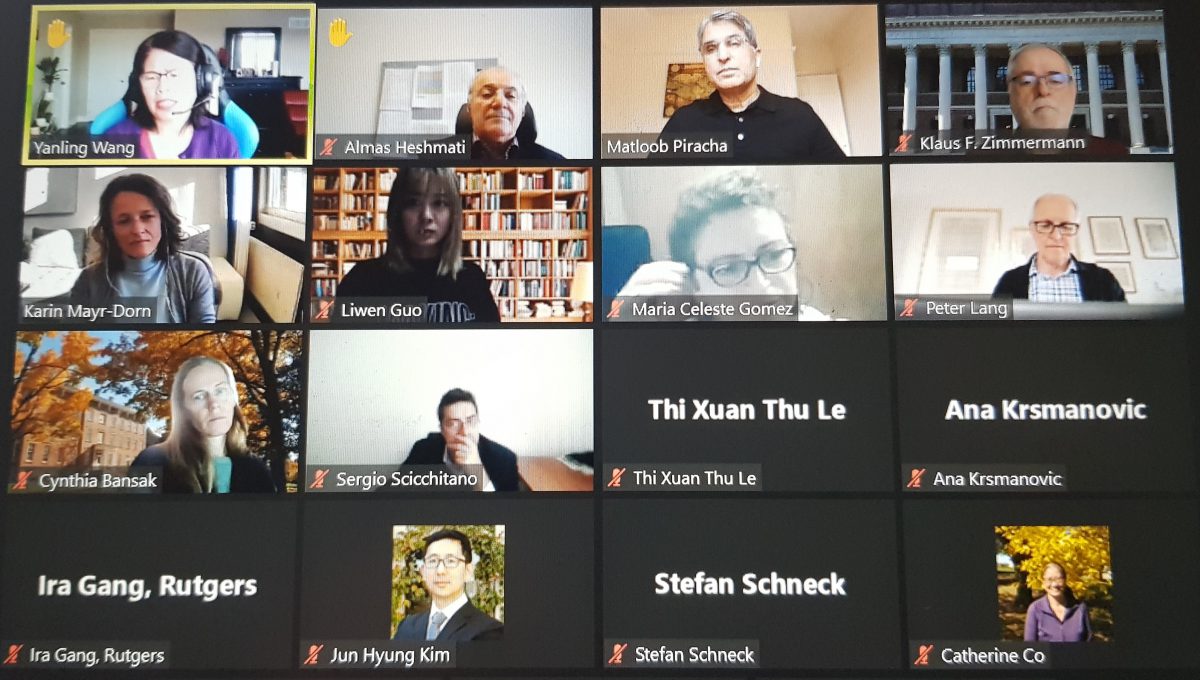
-
Recent Posts
- Global Insights – an Opinion: The US Reciprocal Tariff Policy and the Economic Future of Europe
- Loyalty to US vs pursuit of strategic autonomy: Where will Europe head? Global Insights.
- IZA in Bonn is closing down by December 31, 2025! Some remarks.
- Germany Decides, Europe Reacts. How the German elections affect EU governance. Online Panel Discussion on February 27, 2025, 3:00-5:00 CET (Paris)
- Leading migration policy out of the dead end. Global insights – an opinion.
Archives
Categories
Meta
Subscribe to Blog via Email
-
Privacy & Cookies: This site uses cookies. By continuing to use this website, you agree to their use.
To find out more, including how to control cookies, see here: Cookie Policy
Fall memories Bonn 2021: Reflections on December 2
Posted in Media
Comments Off on Fall memories Bonn 2021: Reflections on December 2
Working from home and income inequality: risks of a ‘new normal’ with COVID-19: Paper by Luca Bonacini, Giovanni Gallo & Sergio Scicchitano receives the Kuznets Prize 2022 of the Journal of Population Economics
The Journal of Population Economics awards annually the Kuznets Prize for the best paper published in the Journal in a particular year. The 2022 Prize based on the articles in 2021 goes to:
Luca Bonacini, Giovanni Gallo & Sergio Scicchitano
Working from home and income inequality: risks of a ‘new normal’ with COVID-19
Journal of Population Economics 34, 303–360 (2021)
https://doi.org/10.1007/s00148-020-00800-7
Readlink: https://rdcu.be/cCofZ
The award ceremony is part of a journal workshop on December 6, 2021. 4-6 pm CEST:
Presentation of Kuznets Prize 2022 & Highlights of JOPE Issue 4/2021 on Covid-19 economics. MORE information and info to participate: LINK

Luca Bonacini 
Giovanni Gallo 
Sergio Scicchitano
- Luca Bonacini, University of Modena and Reggio Emilia, Modena, Italy
- Giovanni Gallo, University of Modena and Reggio Emilia, Modena, Italy; National Institute for Public Policies Analysis (INAPP), Rome, Italy
- Sergio Scicchitano, National Institute for Public Policies Analysis (INAPP), Rome, Italy
***
Paper abstract: In the current context of the COVID-19 pandemic, working from home (WFH) became of great importance for a large share of employees since it represents the only option to both continue working and minimize the risk of virus exposure. Uncertainty about the duration of the pandemic and future contagion waves even led companies to view WFH as a ‘new normal’ way of working. Based on influence function regression methods, this paper explores the potential consequences in the labor income distribution related to a long-lasting increase in WFH feasibility among Italian employees. Results show that a positive shift in WFH feasibility would be associated with an increase in average labor income, but this potential benefit would not be equally distributed among employees. Specifically, an increase in the opportunity to WFH would favor male, older, high-educated, and high-paid employees. However, this ‘forced innovation’ would benefit more employees living in provinces have been more affected by the novel coronavirus. WFH thus risks exacerbating pre-existing inequalities in the labor market, especially if it will not be adequately regulated. As a consequence, this study suggests that policies aimed at alleviating inequality, like income support measures (in the short run) and human capital interventions (in the long run), should play a more important compensating role in the future.
Ends;
Labour-saving automation and occupational exposure
A new GLO Discussion Paper constructs a direct measure of occupational exposure to robotic labour-saving technologies.
GLO Discussion Paper No. 987, 2021
Labour-saving automation and occupational exposure: a text-similarity measure – Download PDF
by Montobbio, Fabio & Staccioli, Jacopo & Virgillito, Maria Enrica & Vivarelli, Marco
GLO Fellows Fabio Montobbio, Jacopo Staccioli, Maria Enrica Virgillito & Marco Vivarelli

Jacopo Staccioli 
Marco Vivarelli
Author Abstract: This paper represents one of the first attempts at building a direct measure of occupational exposure to robotic labour-saving technologies. After identifying robotic and LS robotic patents retrieved by Montobbio et al. (2022), the underlying 4-digit CPC definitions are employed in order to detect functions and operations performed by technological artefacts which are more directed to substitute the labour input. This measure allows to obtain fine-grained information on tasks and occupations according to their similarity ranking. Occupational exposure by wage and employment dynamics in the United States is then studied, complemented by investigating industry and geographical penetration rates.

GLO Discussion Papers are research and policy papers of the GLO Network which are widely circulated to encourage discussion. Provided in cooperation with EconStor, a service of the ZBW – Leibniz Information Centre for Economics, GLO Discussion Papers are among others listed in RePEc (see IDEAS, EconPapers). Complete list of all GLO DPs – downloadable for free.
The Global Labor Organization (GLO) is an independent, non-partisan and non-governmental organization that functions as an international network and virtual platform to stimulate global research, debate and collaboration.
Ends;
Journal of Population Economics Online Event on December 6, 2021: Presentation of Kuznets Prize 2022 and Highlights of Issue 4/2021.
The Journal of Population Economics (JOPE) announces an event for December 6, 16:00-18:00 CET (Maastricht/Dutch time) to present the Kuznets Prize 2022 and a selection of the articles from issue 34(4)/2021. The event is supported by GLO and hosted by UNU-MERIT via Zoom. Editor-in-Chief Klaus F. Zimmermann (UNU-MERIT, Maastricht University, Netherlands, and GLO) will welcome the participants and present the prize. Managing Editor Michaella Vanore, (UNU-MERIT, Maastricht University, Netherlands, and GLO) will guide through the event. Editor Terra McKinnish (University of Colorado Boulder, USA, and GLO) and Associate Editor Kompal Sinha (Macquarie University, Sydney, Australia, and GLO) will also attend to chair sessions. This is a unique opportunity to keep contact with fresh research and to meet the researchers behind.

The event will highlight a selection of the 10 articles published in issue 34(4)/2021 entirely on Covid-19 issues. All articles are published freely accessible and possible to download.
Since the first days of the pandemic, the journal has become a leading outlet for research on the disease by publishing influential articles. JOPE will continue to strengthen this reputation.
Open to the public. Mark your calendars. Detailed program below. The event will be recorded. Please click the link to join the webinar on December 6, 2021; 16:00-18:00 CEST: LINK
https://us02web.zoom.us/j/83267591773?pwd=ZkpuSExTTnQ4emZMTC9QTXl3TzQ1dz09
16:00-16:30
Welcoming Remarks: Michaella Vanore (Managing Editor)
Kuznets Prize 2022: Announcement and presentation: Klaus F. Zimmermann (Editor-in-Chief)
Session I. (16:30-17:15) Chair: Kompal Sinha (Associate Editor)
Martin Kahanec: The impact of repeated mass antigen testing for COVID-19 on the prevalence of the disease
Daniel Graeber: COVID-19: a crisis of the female self-employed
Augusto Cerqua: Local mortality estimates during the COVID-19 pandemic in Italy
Session II. (17:15-18:00) Chair: Terra McKinnish (Editor)
Lamis Kattan: Stay-at-home orders, social distancing, and trust
Piergiuseppe Fortunato: Coronagraben in Switzerland: culture and social distancing in times of COVID-19
Isaure Delaporte: The distributional consequences of social distancing on poverty and labour income inequality in Latin America and the Caribbean
Volume 34, Issue 4, October 2021 with 10 articles on Covid-19 all freely accessible.
- The impact of repeated mass antigen testing for COVID-19 on the prevalence of the disease
Martin Kahanec, Lukáš Lafférs, Bernhard Schmidpeter
OPEN ACCESS » Full text PDF - COVID-19: a crisis of the female self-employed
Daniel Graeber, Alexander S. Kritikos, Johannes Seebauer
OPEN ACCESS » Full text PDF - Local mortality estimates during the COVID-19 pandemic in Italy
Augusto Cerqua, Roberta Di Stefano, Marco Letta, Sara Miccoli
OPEN ACCESS » Full text PDF - Culture and mental health resilience in times of COVID-19
Annie Tubadji
OPEN ACCESS » Full text PDF - School closures and mental health during the COVID-19 pandemic in Japan
Eiji Yamamura, Yoshiro Tsustsui
OPEN ACCESS » Full text PDF - The effect of non-pharmaceutical interventions on the demand for health care and on mortality: evidence from COVID-19 in Scandinavia
Steffen Juranek, Floris T. Zoutman
OPEN ACCESS » Full text PDF - Stay-at-home orders, social distancing, and trust
Abel Brodeur, Idaliya Grigoryeva, Lamis Kattan
FREE READLINK for websites & social media: https://rdcu.be/cAQTl & » Full text PDF - Coronagraben in Switzerland: culture and social distancing in times of COVID-19
Neha Deopa, Piergiuseppe Fortunato
OPEN ACCESS » Full text PDF - The distributional consequences of social distancing on poverty and labour income inequality in Latin America and the Caribbean
Isaure Delaporte, Julia Escobar, Werner Peña
OPEN ACCESS » Full text PDF
Lead article Issue 3/2021
- Maxim Ananyev, Michael Poyker, Yuan Tian
The safest time to fly: pandemic response in the era of Fox News
OPEN ACCESS
TOP 5 of Covid-19 papers in the Journal of Population Economics (as of November 29, 2021):
1. Qiu, Y., Chen, X. & Shi, W.: Impacts of social and economic factors on the transmission of coronavirus disease 2019 (COVID-19) in China. J Popul Econ 33, 1127–1172 (2020). https://doi.org/10.1007/s00148-020-00778-2
Springer measures: 59k accesses, 146 citations; Google citations: 364
2. Bonacini, L., Gallo, G. & Scicchitano, S.: Working from home and income inequality: risks of a ‘new normal’ with COVID-19. J Popul Econ 34, 303–360 (2021). https://doi.org/10.1007/s00148-020-00800-7
Springer measures: 42k accesses, 46 citations; Google citations: 146
3. Milani, F.: COVID-19 outbreak, social response, and early economic effects: a global VAR analysis of cross-country interdependencies. J Popul Econ 34, 223–252 (2021). https://doi.org/10.1007/s00148-020-00792-4
Springer measures: 10k accesses, 33 citations; Google citations: 66
4. Papageorge, N.W., Zahn, M.V., Belot, M. et al.: Socio-demographic factors associated with self-protecting behavior during the Covid-19 pandemic. J Popul Econ 34, 691–738 (2021). https://doi.org/10.1007/s00148-020-00818-x
Springer measures: 13k accesses, 32 citations; Google citations: 128
5. Bonacini, L., Gallo, G. & Patriarca, F.: Identifying policy challenges of COVID-19 in hardly reliable data and judging the success of lockdown measures. J Popul Econ 34, 275–301 (2021). https://doi.org/10.1007/s00148-020-00799-x
Springer measures: 4.8k accesses, 27 citations; Google citations: 46
Ends;
How education and GDP drive the COVID-19 vaccination campaign.
A new GLO Discussion Paper finds that initially authoritarian countries are slow in the vaccination process, while education is most relevant for scaling up the campaign and financial strength of the economies drive them to higher vaccination rates.

GLO Discussion Paper No. 986, 2021
How education and GDP drive the COVID-19 vaccination campaign – Download PDF
by Ngo, Vu M. & Zimmermann, Klaus F. & Nguyen, Phuc V. & Huynh, Toan L.D. & Nguyen, Huan H.
GLO Fellows Vu Ngo, Toan Luu Duc Huynh, Huan Huu Nguyen, GLO Affiliate Phuc Nguyen and GLO President Klaus F. Zimmermann

Phuc Nguyen 
Toan Huynh 
Klaus F. Zimmermann
Author Abstract: Since vaccination is the decisive factor for controlling the COVID-19 pandemic, it is important to understand the process to vaccination success. We identify a variety of factors playing a crucial role including the availability of vaccines, pandemic pressures, economic strength (GDP), educational development and political regimes. Examining the speed of vaccinations across countries, we find that initially authoritarian countries are slow in the vaccination process, while education is most relevant for scaling up the campaign and financial strength of the economies drive them to higher vaccination rates.
Further research on the pandemic:
- Gokhan Karabulut, Klaus F. Zimmermann, Mehmet Huseyin Bilgin and Asli Cansin Doker (2021), “Democracy and COVID-19 Outcomes”, Economics Letters, Vol. 203, June 2021, 109840 Open Access; free PDF. https://doi.org/10.1016/j.econlet.2021.109840
- Klaus F. Zimmermann, Gokhan Karabulut, Mehmet Huseyin Bilgin and Asli Cansin Doker (2020), “Inter-country Distancing, Globalization and the Coronavirus Pandemic“, The World Economy, Vol. 43, pp. 1484-1498. OPEN ACCESS, doi:10.1111/twec.12969. PDF.
MORE from the GLO Coronavirus Cluster: LINK

GLO Discussion Papers are research and policy papers of the GLO Network which are widely circulated to encourage discussion. Provided in cooperation with EconStor, a service of the ZBW – Leibniz Information Centre for Economics, GLO Discussion Papers are among others listed in RePEc (see IDEAS, EconPapers). Complete list of all GLO DPs – downloadable for free.
The Global Labor Organization (GLO) is an independent, non-partisan and non-governmental organization that functions as an international network and virtual platform to stimulate global research, debate and collaboration.
Ends;
Is raising the school leaving age enough to decrease dropping out?
A new GLO Discussion Paper finds that a school reform in Hungary increasing the length of schooling did not decrease the probability of dropping out of secondary school at all levels.
GLO Discussion Paper No. 985, 2021
Is raising the school leaving age enough to decrease dropping out? – Download PDF
by Adamecz-Völgyi, Anna
GLO Fellow Anna Adamecz-Völgyi
Author Abstract: This paper examines the effects of increasing the compulsory school leaving age from 16 to 18 in Hungary using a difference-in-regression-discontinuities design identification strategy. While the reform increased the length of schooling, it did not decrease the probability of dropping out of secondary school, either on average or among the most at-risk group of Roma ethnic minority young people. Due to grade retentions, marginal students were older than their peers and couldn’t have made it to the final grade of secondary school by age 18. Neither did the reform increase the probability of employment at age 20 and 25. I show descriptive evidence that the share of disadvantaged students increased heavily in vocational training schools -that most marginal students attended- and potentially crowded out resources. This mechanism raises concerns about using school leaving age reforms as instrumental variables for education as it may violate its monotonicity assumption.

GLO Discussion Papers are research and policy papers of the GLO Network which are widely circulated to encourage discussion. Provided in cooperation with EconStor, a service of the ZBW – Leibniz Information Centre for Economics, GLO Discussion Papers are among others listed in RePEc (see IDEAS, EconPapers). Complete list of all GLO DPs – downloadable for free.
The Global Labor Organization (GLO) is an independent, non-partisan and non-governmental organization that functions as an international network and virtual platform to stimulate global research, debate and collaboration.
Ends;
Fertility, Family Policy, and Labor Supply: Quasi-Experimental Evidence from France.
A new GLO Discussion Paper finds that restricting family allowance eligibility criteria decreases fertility and increases both male and female labor supply.
GLO Discussion Paper No. 984, 2021
Fertility, Family Policy, and Labor Supply: Quasi-Experimental Evidence from France – Download PDF
by Elmallakh, Nelly
GLO Fellow Nelly El-Mallakh
Author Abstract: This paper examines fertility and labor supply responses to a French policy reform that consisted in conditioning the amount of child allowances on household income. Relying on Regression Discontinuity Design and administrative income data, the paper finds that restricting family allowance eligibility criteria decreases fertility. The results also highlight that receiving half the amount of the allowances or not receiving any leads to an increase in both male and female labor supply. Auxiliary regressions show that at least part of the decline in fertility is due to timing effects, as the fertility impact declines as women’s age increases.

GLO Discussion Papers are research and policy papers of the GLO Network which are widely circulated to encourage discussion. Provided in cooperation with EconStor, a service of the ZBW – Leibniz Information Centre for Economics, GLO Discussion Papers are among others listed in RePEc (see IDEAS, EconPapers). Complete list of all GLO DPs – downloadable for free.
The Global Labor Organization (GLO) is an independent, non-partisan and non-governmental organization that functions as an international network and virtual platform to stimulate global research, debate and collaboration.
Ends;
GLO Virtual Seminar with Karin Mayr-Dorn on “Trade diversion and labor market adjustment” Report & Video of the Event. And forthcoming GLO Virtual Seminar with Mathilde Maurel on December 2.
The GLO Virtual Seminar is a monthly internal GLO research event chaired by GLO Director Matloob Piracha and hosted by the GLO partner institution University of Kent. The results are available on the GLO website and the GLO News section, where also the videos of the presentations are posted. All GLO related videos are also available in the GLO YouTube channel. (To subscribe go there.)
Forthcoming (GLO members & special invitations):
December 2, 2021; 1 pm London/UK time: Mathilde Maurel (CNRS, FERDI and GLO
A new approach for evaluation of the economic impact of decentralized electrification projects (with J.C. Berthélémy)
The November 2, 2021 seminar in the series was given on London/UK time at 1-2 pm, by Karin Mayr-Dorn (University of Linz and GLO). See below for a report and the full video of the seminar.


Report
Trade diversion and labor market adjustment: Vietnam and the U.S.-China trade war
GLO Virtual Seminar on November 4, 2021
Karin Mayr-Dorn (University of Linz and GLO)
Video of the Seminar.





Ends;
Vicious Circle or New Paradigm? Exploring the Impact of Shadow Economy on Labour Market in Latin America and Eurozone
A new GLO Discussion Paper studies how institutional quality affects the size of the informal economy to find a positive and a significant association between labor productivity and the size of the shadow economy, among others.
GLO Discussion Paper No. 983, 2021
Vicious Circle or New Paradigm? Exploring the Impact of Shadow Economy on Labour Market in Latin America and Eurozone – Download PDF
by Khorana, Sangeeta & Caram, Santiago & Biagetti, Marco
GLO Fellow Sangeeta Khorana & GLO Affiliate Marco Biagetti

Author Abstract: The relationship between shadow economy (or informal economy) and development has been extensively researched. But there is a lack of consensus on how institutional quality affects the size of informal economy in any country. Using the Kuznets Curve hypothesis we assess the relationship between institutional quality and the size of SE for a group of Latin American and Eurozone countries for 1991-2015. We examine the rationale of the ‘exclusion’ and ‘escape’ theories in short and long-run with the multiple indicators multiple causes (MIMIC) model. We use two techniques, namely an instrumental variable (IV) and Fully Modified OLS (FMOLS) approach. The results show positive and a significant relationship between labour productivity and the size of the shadow economy. We also find that the size of the informal sector is related to the institutional framework, and while the size of the informal sector varies across countries, both formal and informal sectors can co-exist in the long run. High corruption together with an excessive tax burden and adverse socio-economic conditions impact the size of the informal sector in an economy.
Featured image: JR-Korpa-on-Unsplash

GLO Discussion Papers are research and policy papers of the GLO Network which are widely circulated to encourage discussion. Provided in cooperation with EconStor, a service of the ZBW – Leibniz Information Centre for Economics, GLO Discussion Papers are among others listed in RePEc (see IDEAS, EconPapers). Complete list of all GLO DPs – downloadable for free.
The Global Labor Organization (GLO) is an independent, non-partisan and non-governmental organization that functions as an international network and virtual platform to stimulate global research, debate and collaboration.
Ends;
Does Multitasking Affect Students’ Academic Performance? Evidence From a Longitudinal Study
A new GLO Discussion Paper finds that multitasking does not work out for students.

GLO Discussion Paper No. 982, 2021
Does Multitasking Affect Students’ Academic Performance? Evidence From a Longitudinal Study – Download PDF
by Amez, Simon & Baert, Stijn & Heydencamp, Emily & Wuyts, Joey
GLO Fellow Stijn Baert
Author Abstract: Multitasking – alternating between two different tasks at the same time – has become a daily habit for many university students. However, this may come at a cost since the existing literature emphasises the negative association between multitasking and academic performance. Nonetheless, this literature is based on cross-sectional observational data so that that estimates cannot be given a causal interpretation. To complement these studies, we opted for a longitudinal design in this study. Specifically, for three consecutive years, students at two Belgian universities, in more than ten different study programmes, were surveyed on their multitasking preferences and academic performance. Then, these results were merged with the students’ exam scores. We exploited the longitudinal character of the data by running random and fixed effect models. Our results indicate that the positive and negative aspects of multitasking with respect to academic performance cancel each other out.

GLO Discussion Papers are research and policy papers of the GLO Network which are widely circulated to encourage discussion. Provided in cooperation with EconStor, a service of the ZBW – Leibniz Information Centre for Economics, GLO Discussion Papers are among others listed in RePEc (see IDEAS, EconPapers). Complete list of all GLO DPs – downloadable for free.
The Global Labor Organization (GLO) is an independent, non-partisan and non-governmental organization that functions as an international network and virtual platform to stimulate global research, debate and collaboration.
Ends;







